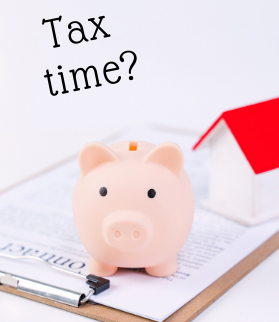
Tax time is approaching again! Was that a groan? We understand. If you’re like most property investors, trawling through receipt upon receipt to tally up your allowable deductions is probably not your idea of fun.
So, as tax time looms we wanted to share our pre-tax time checklist to help make things just a bit easier for you.
Organise your receipts and records
It’s time to dust it off that shoebox of receipts and get your paperwork in order. If you discover the ink on some of the receipts has faded, keep in mind that you can use a bank statement as evidence of when the purchase occurred. It’s a good idea to sort the expenses into various categories, such as strata levies, rates and water charges, property management, and maintenance and repairs. Creating a spreadsheet or using an expense tracker mobile app may also be a better idea than the old shoebox filing method, as you can track your expenses throughout the year and when tax time comes, more easily sum up amounts for inclusion in your tax return.
Consult your tax accountant
Just like you’d use a hairdresser to cut your hair, or a mechanic to fix your car, it’s important to seek expert advice from a professional tax advisor about your investment property and tax return, so that you can be sure it’s done correctly. They will be able to answer tricky questions about whether you have to pay Goods and Services Tax in relation to your rental income, or set up Pay As You Go tax instalments (these may be necessary if you make a profit from renting the property). Using an accountant is also likely to save you time and money, as they’ll know exactly what deductions you can qualify for. After all, you don’t know what you don’t know! This is why we recommend speaking to a qualified accountant.
Tally up your allowable deductions
Many of the expenses associated with your investment property will be deductable, but not all. In some cases, you may only be able to claim part of the expenses. Certain deductions can be claimed in the tax year you incurred the expense, while other costs must be claimed over several years (depreciating assets and capital works expenses, for example). The Australian Tax Office’s Guide for rental property owners, Rental Properties 2019 , is a great tool for trying to make sense of your potential tax deductions. Following are the types of deductions you may be able to claim, but again, please consult your accountant to be sure they apply to you.
Immediate deductions
According to the ATO guide mentioned above, you may be able to claim an immediate deduction (in the year you incur them) for expenses you incur for owning, managing and maintaining your property: property management fees, advertising for tenants, insurance, interest on loans, land tax, legal expenses, pest control, maintenance, repairs and so on.
With the tax time just around the corner, it may be a good idea to attend to any maintenance or repairs that may be required on your investment property now. Depending on your circumstances, it could be possible to claim the expenses as tax deductions on your 2019-20 tax return.
Expenses deductible over several years
Borrowing expenses, amounts for decline in value of depreciating assets, and capital works deductions may be claimed over a number of income years. It’s important to have a professionally prepared depreciation schedule if you want to claim for depreciating assets, so contact your local Quantity Surveyor for assistance if you need to organise or update an existing one prior to submitting your tax return.
Borrowing expenses
Borrowing expenses include loan establishment fees, title search fees charged by the lender, costs for preparing and filing mortgage documents, mortgage broker fees (we don’t charge fees, but some do), stamp duty charged on the mortgage, fees for a valuation required for loan approval and lender’s mortgage insurance. Borrowing expenses exceeding $100 are spread over five years or the term of the loan, whichever is less, otherwise they are deductible in the year incurred.
Depreciating assets
When you buy an investment property, you’re essentially purchasing the building plus other items of ‘plant’, such as the air-conditioner, cooker and hot-water service. These are depreciating assets and you can claim depreciation for them, provided you have a proper depreciation schedule, as mentioned above. If you have a depreciation schedule, you can deduct an amount equal to the decline in value of the depreciating asset during the income year.
Capital Works Deductions
Certain kinds of construction expenses can be claimed as capital works deductions. For example, if you add a room or remove an internal wall, these deductions are claimable once the construction is finished, and are generally spread over a period of 25 or 40 years. The capital works deductions you claim will be taken into account when working out your capital gain or capital loss from the rental property.
Determine your assessable rental income
For those who are new to property investing, your rental income is the total amount of rent and associated payments you receive, or become entitled to, when you rent out the property. The full amount of rent you earn must be noted in your tax return. Talk to your accountant if you have any issues working it out.
Review your loans and finances
The end of the financial year is a great time to review how your investment property is performing and to review how well your loan is serving you. To make sure your investment loan is still right for your needs, speak to us and we’ll compare the market for you and show you what’s out there.
There are many kinds of finance options for investment property mortgages that you may want to consider. For example, an option that is popular with many property investors is a loan that allows them to pay interest only in advance. This is a fixed-rate loan that allows you to prepay 12 months of interest in advance. This option could allow you to receive a discount on your interest rate, protect you from rate rises during the year and help you to maximise your cash flow knowing there will be no further repayments until next year. Depending on your financial circumstances, it could also be very beneficial to you come tax time (but again, we do recommend that you consult your tax accountant to see if this is the right strategy for you).
Start planning for the year ahead
It always pays to plan ahead so you can arrange your finances accordingly. As your mortgage broker, we can help you determine if you can access your equity to renovate, or perhaps expand your investment portfolio. Remember, asking us to give you a free property investment loan review could potentially save you money, so it’s worth giving us a call.
We hope these tips come in handy when preparing for tax time. Alternatively, you could talk to us about how you could use it to continue building wealth for your future through your property investments.
If that’s the case, just give us a call. We are only too happy to help!
This page provides general information only and has been prepared without taking into account your objectives, financial situation or needs. We recommend that you consider whether it is appropriate for your circumstances and your full financial situation will need to be reviewed prior to acceptance of any offer or product. It does not constitute legal, tax or financial advice and you should always seek professional advice in relation to your individual circumstances. All loan applications are subject to lenders terms and conditions, and eligibility criteria. Lender fees and charges will apply.

